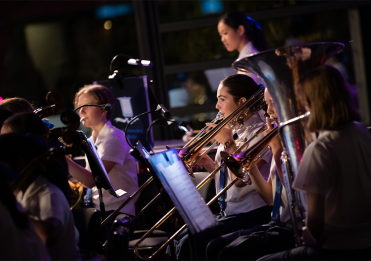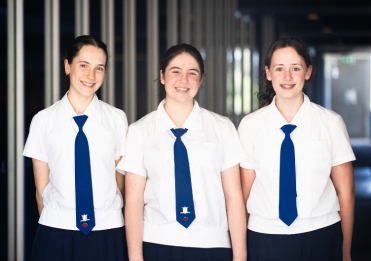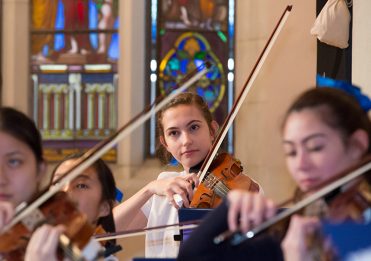Junior Strings Festival
‘I’ve enjoyed working with the different conductors and teachers.’
‘It’s been fun to connect with my friends from Elgar Strings and play together.’
‘I like playing the really interesting music with a larger group of people.’
‘I loved it when the Quartet and the other students from the other orchestras played together—it sounded amazing!’
These are some of the comments by students from BGGS Elgar Strings and Dvorak Strings about how they have enjoyed the time to connect and play music with students from BGS Corelli Consort and Paganini Strings, in the recent Junior Strings Festival.
On Tuesday and Wednesday afternoons this week, we gathered our junior orchestras together in the String Room and the Gehrmann Theatre to rehearse, play games, and have fun, while learning more about playing the Violin, Viola, Cello, or Double Bass. Most importantly though, we were learning and performing together.
The Festival culminated in an exciting concert on Wednesday night that was a wonderful, live demonstration of the students’ dedication and skills.
Elgar Strings and Paganini Strings performed an eerie version of The Grotto by Todd Parrish, a spine-chilling rendition of The Abandoned Funhouse by Balmages, and a delightfully surprising performance of Nightscapes by Stephen Chin.
Dvorak Strings and Paganini Strings got us all tapping our toes along to Sword Dance arranged by Bob Phillips, enchanted the crowd with a relaxing performance of The Gentle Boats at Port Fairy from Two Australian Sea Pictures by Stephen Chin, and inspired us with their powerful interpretation of Beyond the Thunder by Deborah Baker Monday.
All musicians then combined to perform the inspirational Into the Sky and Momentous by Brian Balmages, which featured a string quartet of experienced players: Kaiyu Su (10R); Charlize Chang (10H); Georgia Somerville (10G); and Eloise Christie (10H).
It was great to see the level of achievement and progress made by all the students, some of whom have just started learning their instrument this year. We are all looking forward to seeing how they progress as musicians as they move onwards and upwards through our amazing music program.
We extend our deep gratitude to the wonderful BGGS Music Support Group (MSG) for their support of this event in providing the sausage sizzle to feed the students on the evening.
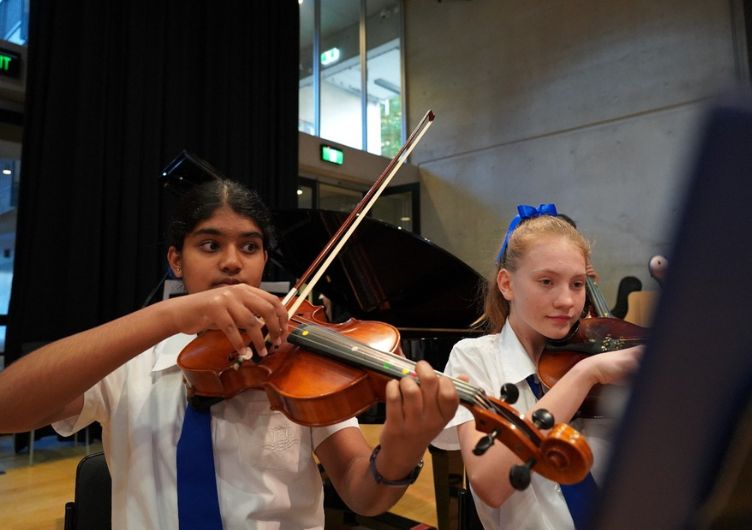
Sarah Shakeel (7G) and Florian Clayton (7B) focus their attention at the Junior Strings Festival
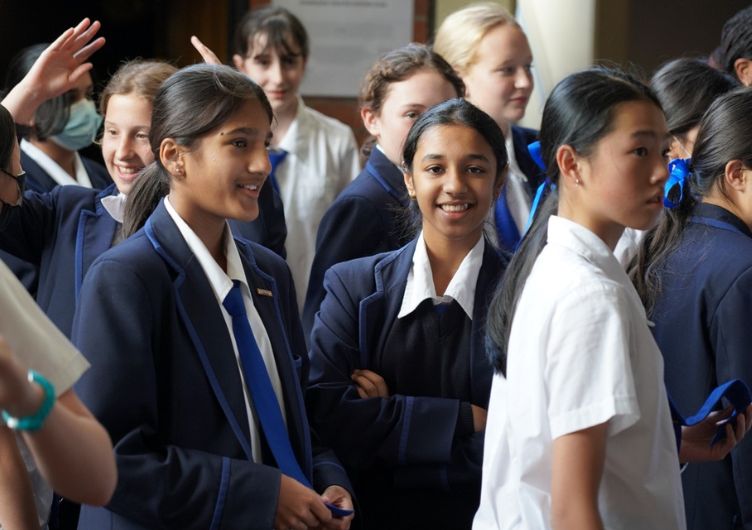
Thisali Wijesundera (7G), Rishika Vijeyakumar (8G), and Emily Tran (7E) taking a break from rehearsal at the Junior Strings Festival
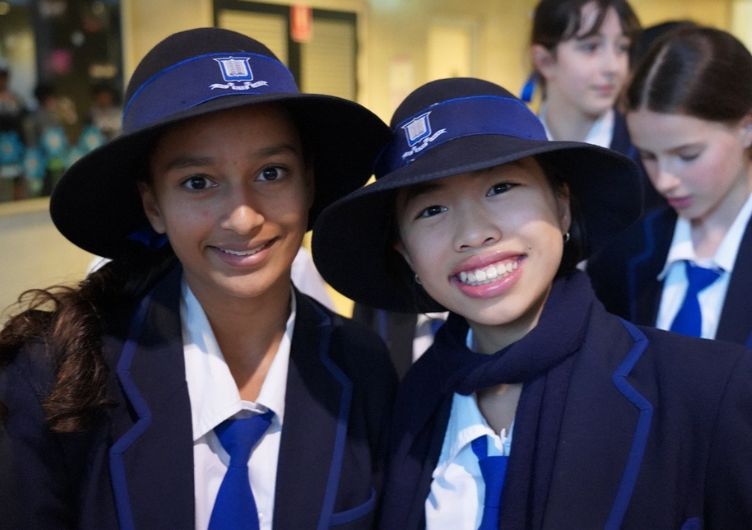
Pallavi Cherian (7W) and Sophie Lee (7O) getting ready to hit the stage at Junior Strings Festival
MSG News
Mark your diaries for our inaugural Soirée on Saturday 8 October! This event is currently being curated by the MSG and Ms Karin Schaupp. The evening will feature several guest parent and staff performers in a relaxed and intimate surrounding. Sit back, relax, and be entertained by the talent within our vibrant musical community.
The evening is an opportunity to meet other music parents, with refreshments on the Pool Lawn from 5.30 pm and a post-concert dinner from ‘That Greek Truck’.
Tickets are now available here. There is limited availability of seating and ticket sales have already progressed. Please book in advance to avoid disappointment.
Please contact the Music Support Group at msgbggs@gmail.com.au if you have any questions.

Spare Gala programs available
We have some spare Gala—Luminescence programs from the concert. If students would like to collect one, you are welcome to come down to the Instrumental Music department to do so. Please see Mrs Harper in the Instrumental Music Office to get yourself a copy.
Talent search
We are looking for talented students who may have an interest in playing, or finding out more about, one of the more important and rare instruments. We are specifically looking for students who may be interested in discovering more about the Tuba, Double Bass, Viola, or Euphonium. Maybe you are currently playing another instrument and would like to accelerate your way through our ensemble structure by playing one of these rarer instruments. Perhaps you are a Trumpet player with braces and would like a similar instrument that is less taxing on the embouchure. Or maybe you just want to be like the cool kids and play an instrument that few others can.
Whatever your reasoning, we would love to meet you to talk through it all. Please see Ms Porter, Mr Zorzetto, or Mr Johnston any time before the holidays to find out more.
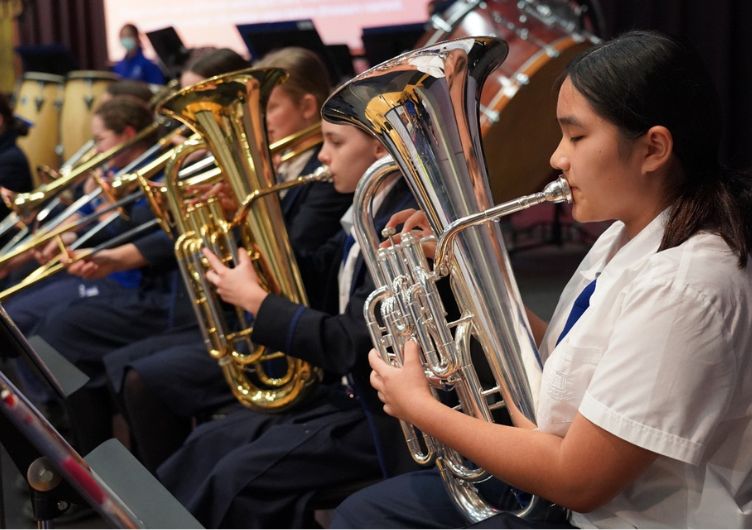
Jessica Allinson (7B) performing on the Euphonium
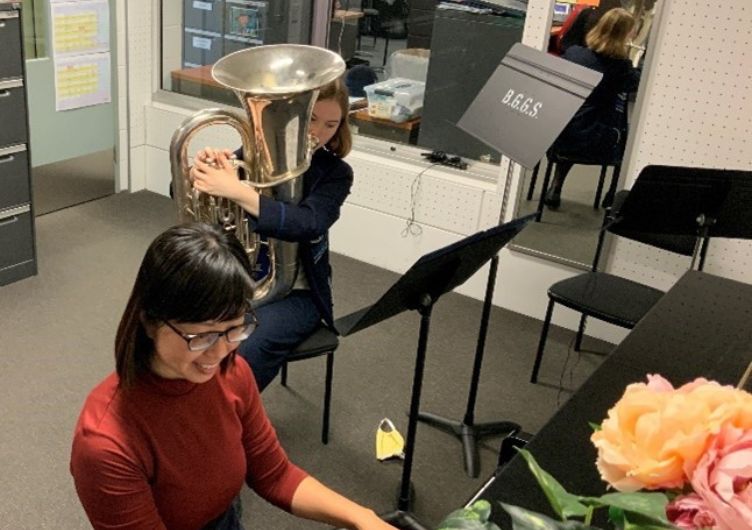
Dorothy Rae (10G) with Mrs Kerry Nian rehearsing on the Tuba
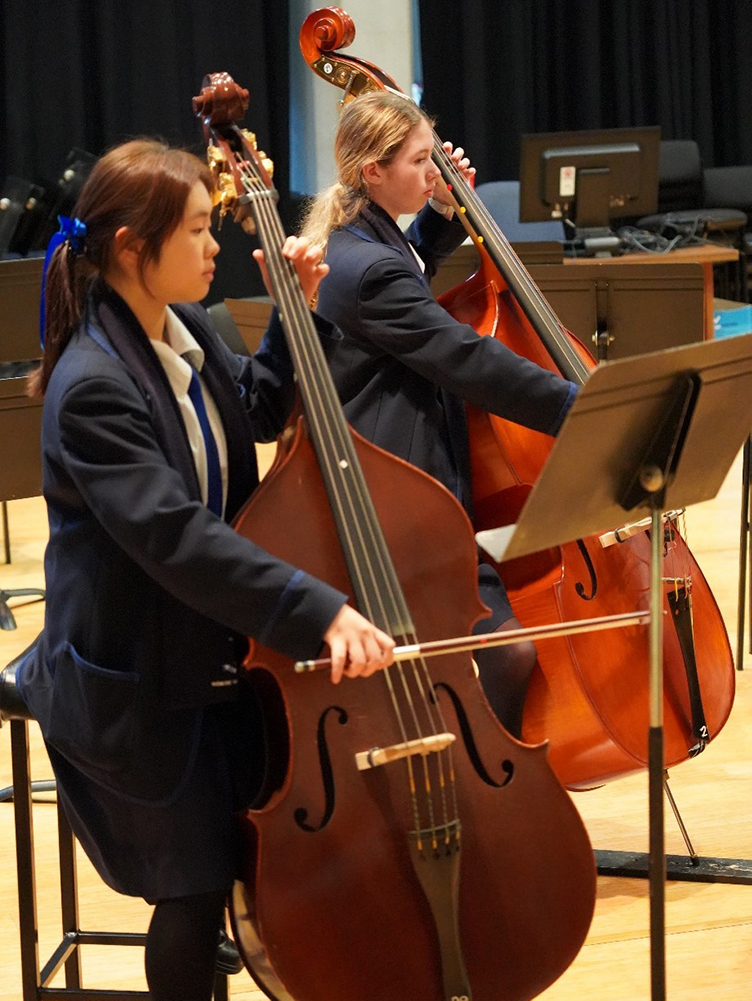
Annabel Wang (10R) and Brielle Porter (9O) playing their Double Basses
Year 12 farewell
Each year, we say thank you and bid a fond farewell to our Year 12 Instrumental Music students in a special evening celebration at BGGS. This year, on Tuesday 11 October, we will have the opportunity to extend our deep gratitude and best wishes to our wonderful 2022 Year 12 girls. It is a bittersweet moment when we look across the room at all of the students who have made such a long and lasting commitment to their music education at BGGS. It is an evening where we look back fondly at their first steps inside our school, their progression over the years, and their triumphant final moments with us at BGGS. We hope that all our Year 12 students and their families can attend this evening with us. Stay tuned for further details in the coming weeks.
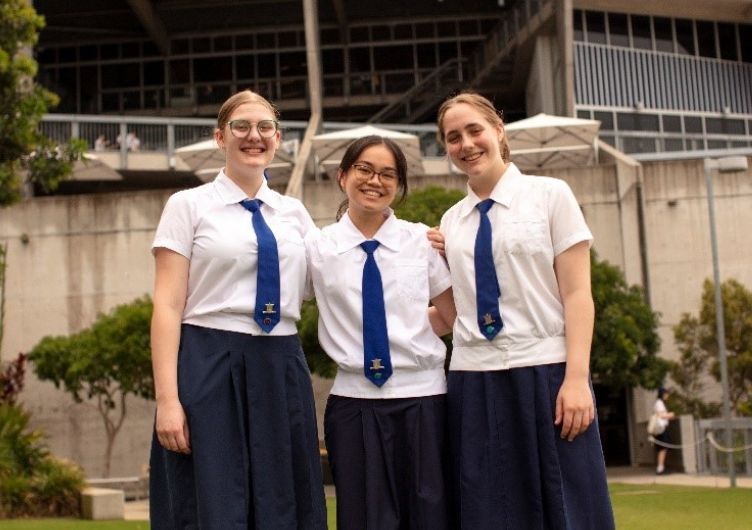
Our 2022 Music Captains: Pascal Green (12G); Maddy Khoo (12E); and Sally Grice (12E)
From the teaching studio
This week we were walking by the Band Room and discovered Mr Johnston holding a Trumpet lesson with Lykke Lee (10L) and Claudia Wallwork (8M). We stopped to have a quick chat with the girls and Mr Johnston to discover what makes Brass so awesome at BGGS.
The Trumpet is quite a bright-sounding instrument. Does it stand out when you play it in ensembles at BGGS?
Lykke—‘Yes, the Trumpet is definitely a very loud instrument, but it doesn’t exactly stand out in ensembles. The Trumpet usually plays the melody of the song and should be loud; however, when playing in an ensemble, the whole group should play in harmony and blend well together’.
Claudia—‘It definitely does stand out, but I am trying to learn how to manage that and be able to blend in more with the ensemble’.
We see the Trumpet in many ensembles in the School. Is the flexibility of the Trumpet one of the things that drew you to playing it? Which type of ensemble is the most enjoyable for you?
Lykke—‘The flexibility of the Trumpet was something that I only took notice of once I started learning the instrument at School, so it wasn’t something that particularly drew me to choose it. The type of ensemble that is the most enjoyable for me is the concert band, as I thoroughly enjoy learning new pieces and working with my peers every single week’.
Claudia—‘I love being able to watch all the different types of ensembles in the School and see the Trumpet being played in a lot of them. This has definitely inspired me to practise and improve, to hopefully be able to be a part of these ensembles in the future’.
What is one thing that you wish your Grammar sisters knew about playing Brass here at BGGS?
Lykke—‘The Brass program at BGGS is at times challenging, but it’s a great program that allows you to improve and grow as a player. Have fun and enjoy your instrumental learning journey at BGGS’.
Claudia—‘It’s so fun being part of bands and being able to play music with your peers. The results are so rewarding and worth the hard work’.
Mr Johnston was also available to speak with us about his roles at BGGS and what it means to him.
What do you think is one of the biggest misunderstandings about Brass instruments?
Mr Johnston—‘One of the greatest myths is that Brass instruments are a boy’s instrument. All instruments are unisex. Some of the best Flute players I have taught are boys and some of the best Tuba players I’ve taught are girls. In some respects, girls have an advantage with Brass instruments over boys because they usually think deeply about techniques and skills, rather than trying to “muscle” the instrument.’
What is the most enjoyable part of your role at BGGS?
Mr Johnston—‘Seeing the whole process of students’ development from the moment they walk through the white picket fence for the first time, through to when they finish their final Gala performance. Watching the musical growth, emotional maturity development, and elation on the students’ faces following each performance is, and I think always will be, the most rewarding part of my time here at BGGS’.
What are the characteristics and/or personality traits that help make a good Brass player?
Mr Johnston—‘The tricky balance to strike is maintaining a sense of fun, curiosity, and wonder while sometimes working very hard towards a goal that is bigger than the individual. The ability to focus on the bigger picture in a world where most things are so individualised is challenging for our young people. Brass players need to become comfortable with being a little different from the majority, be prepared to stand out, and work towards developing ironclad courage under pressure situations. Brass instruments have the capability of sounding soulful, reflective, and beautiful, as well as being a heroic, blazing force at the back of the ensemble. Developing the imagination and flexibility to portray this wide gamut of emotion through what is effectively a piece of shiny plumbing is the fun within the challenge!’
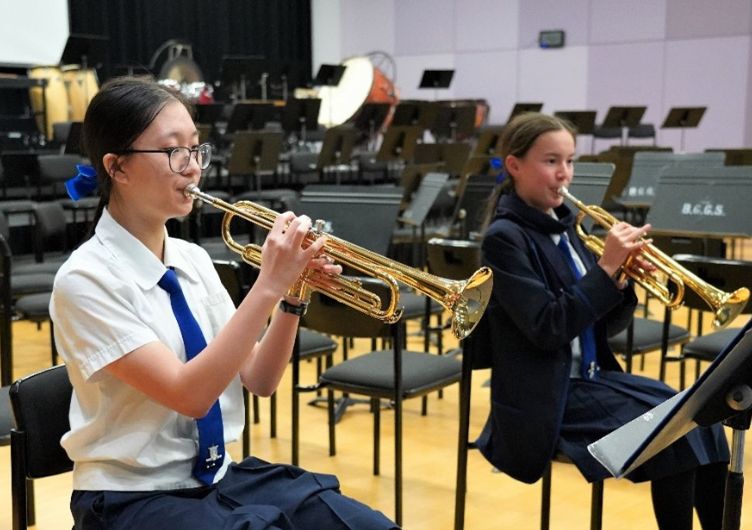
The study of Music and its potential influence over academic improvement
Over the past few decades, much has been studied and written about the potential influence of the study of Music on academic achievement. Though teachers of Music will usually approach the topic of studying Music from a love of the artform itself, it is sometimes useful to delve deeper into the now universally recognised tangible benefits of studying Music when considering other academic pursuits.
From the outset, I should mention that it is not necessarily our intent in Instrumental Music to create cohorts of professional musicians. Our guiding principles, and articulated motivation, is to impart and encourage creative and deep, purposeful thinking while demonstrating empathy for others. To recognise and appreciate the beauty in our world, develop innovative solutions to complex problems, and imagine situations from an array of different perspectives takes time, courage, contemplation, and intellectual rigour.
The recent ‘Jobs Summit’ in Canberra has highlighted (once again) the desperate need for creative skills in the current and future workforce. The complexity of teaching creativity is that it requires creative thinking to develop the framework in which the skill is to be taught. This is somewhat of a conundrum for those who, perhaps, have not been encouraged to think creatively in their own formal education. The complexity of teaching creativity is embedded in the fact that creativity is not a singular term. It can be taught through myriad mediums—Music is just one. Creativity takes many forms and has no human limits. Therein lies its power.
An excellent article via The Conversation was penned recently that addresses creativity in education, politics, and the workforce. I encourage you to take a few moments to consider the article’s perspective.
Additionally, most teachers of Music have consistently been informing students that universities and employers are actively searching for potential students and employees, respectively, who possess and can demonstrate, creativity in their schooling or work-life. The most obvious form of this would be a demonstrable commitment to extra-curricular activities while at School. One of Australia’s leading universities in the field of medicine, actively asks for letters of support for student candidates that detail students’ leadership skills and personality traits—this can be best explored by using extra-curricular activities and internships as examples, e.g. how they undertake new challenges, and most importantly, their capability to overcome obstacles that they have encountered along the way.
There are countless articles that address the effect of music on the brain—specifically, the study of Music in addition to performing, and listening, to music. A quick snapshot article out of Johns Hopkins Medicine is a good start. Another enormous body of information is located in the work of Dr Anita Collins at Bigger, Better Brains.
It has been incontrovertibly established over decades that when we are talking about improving students’ academic achievements, we are also talking about how they involve themselves in activities outside of purely academic pursuits. But for all the associated fringe benefits of studying music, there is one overarching reason to study Music, and that is music performance requires high-level creative thinking that demands a person to look beyond the written word, to feel beyond reactive behaviours, and to involve themselves in a life full of the wonder, excitement, and beauty that surrounds them.
Mr Paul Johnston
Assistant Director of Instrumental Music
Looking Ahead
- Father Daughter Dinner—Thursday 15 September
- MSG Meeting—Wednesday 5 October
- Music Parents Soiree—Saturday 8 October
- Year 12 Farewell—Tuesday 11 October
- New Year 7 Auditions—Friday 28 and Saturday 29 October


